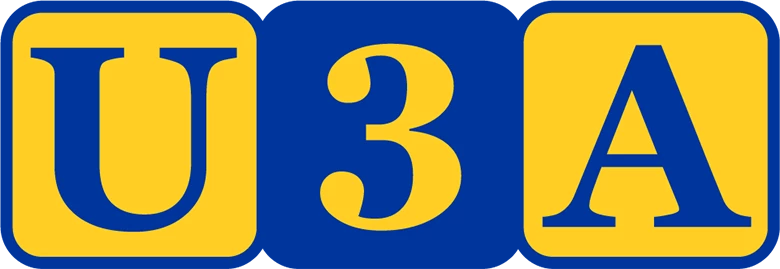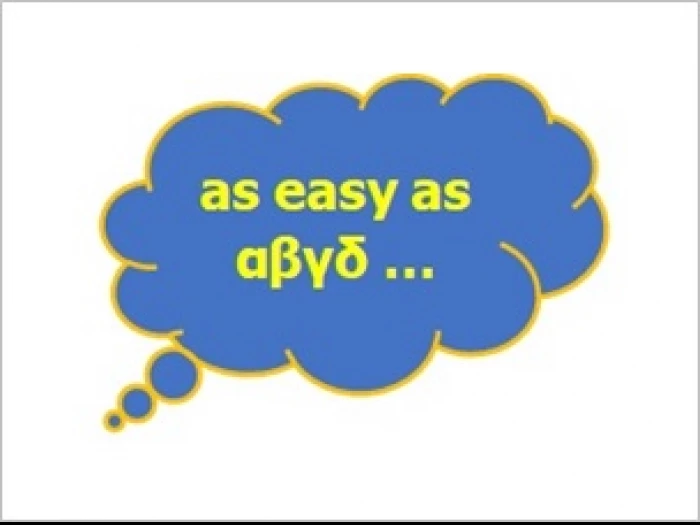I love curling up with a good book, you could say it's my Achilles Heel. And when I admitted to scribbling the odd lines myself, I did rather spill the beans. Finding myself caught between a rock and a hard place, I agreed to tackle this Zoom groups' project for the Herculean task that it was. Now, I've always been one to call a spade a spade: I dabble in fiction writing, not factual reporting. But once I take on a challenge, I've always been one to leave no stone unturned. So when I began investigating the group activities currently on offer, there it was. Sitting at the top of the list, alphabetically speaking, that is. Ancient Greek Language. A mystery? Perhaps. A challenge? Most definitely! How could I resist?
Okay, I hear you ask: what's THAT got to do with life in 2021? Nobody speaks like that anymore, it's totally outdated, in fact it's positively ancient! But take another look at the familiar phrases above, yes, the ones marked in italics. Type the word 'Greek' into Google, followed by each phrase. You might be surprised by what you find ...
Oh, you're back already? Now, have I finally got your full attention? It gives me the greatest of pleasure to introduce John Williams, who took me on a whistle-stop tour of The Ancient Greek Language Group. Here are the highlights:
++++++++++
Me: Ancient Greek, that's a very unusual hobby – how did you get into it?
John: Well, my father was a vicar in Lancashire. And he was a very keen Greek scholar. So as children, he taught me, and my brother the Greek vocabulary and the alphabet and the grammar. We studied some at school, not a great deal. And not much at university, but I kept an interest in it. When retired I was keen to study the Open University two-year programme of Ancient Greek. I took those two years, and successfully passed. I also found a tutor, to take me on further than that. I attend the University of Durham annual summer schools in Ancient Greek. And I'm in contact with other Ancient Greek study groups that meet online.
Me: And turning your personal hobby into a group activity – was that difficult?
John: I was an English teacher for thirty-five years. When I retired I thought I could use my teaching skills to share an interest and make new friends. And I thought Greek would be an interesting area, one that I hadn't taught before but would be an exciting challenge. So I went down to the Civic Centre, and had a word with the chairman, who said 'put a list up, and see if anyone would like to sign up'. To my surprise, within a week eight people had signed up. I didn't think we'd have that many! We've been meeting for nine years, and we've included one or two more since then. But the original eight, they're still there.
Me: What's the difference, between ancient Greek and modern Greek?
John: About two thousand years! In Ancient Greek language, you're reading the ancient texts. The poetry, the plays, the history, the philosophy, the science. We've learnt how to read it out, but we don't have actual conversations. If you went to a Modern Greek course, you would be having conversation lessons. You'd be learning what to say in a shop, or how to order a drink, or what to do when you go into the post office. We don't do any of that. We look at the original texts.
Me: Aesop's fables, Archimedes 'eureka', Alexander the Great. As children, people are fascinated by the Greeks. As grownups, they're not. Do people just fall out of love with the Greeks?
John: I think they do. And they do it, perhaps, indirectly. Our alphabet has origins in the Mediterranean. So Greek is in your alphabet, what you're writing now. Greek is in mathematics. The Ancient Greeks drew on other cultures and showed a genius for assimilating knowledge into coherent systems of thought. As a result, they gave us psychology, philosophy, physics, chemistry, biology, history and literature, astronomy, tele-vision and medicine to name but ten. How intriguing that the Ancient Greeks proved the world is a sphere by walking towards the horizon at night when more stars rise in the sky.
Me: The Acropolis is a top attraction in Greece – why are tourists still drawn to this set of ruins?
John: Well, on those set of ruins, democracy was invented. Devised by the Athenians in 507 BC, it's one of the Greeks' greatest gifts to us. On those stones, the great thinkers developed democracy. The ruins themselves, they're wonderful creations, with all sorts of architectural and mathematical proportions in them which defy modern engineers in many cases. And they teach people how to build houses, to keep it practical.
Me: What's your argument for teaching a dead (i.e. unspoken) language, in today's schools?
John: Very simply – Ancient Greek teaches us who we are, through ancient texts. So you can make a pretty good case for Ancient Greek, because it was the very first (language) to rationalise the pantheon of gods. The Ancient Greeks attributed human qualities to the gods. And gave us a concept of the mind, which no other culture did. You can trace it, from Homer (700BC) down to The New Testament. The Greeks discovered what the mind can do ... there you go, that's the place of Greek.
Me: The ancient texts. Some say they're complex parables, of philosophical interest only. Others say they're simple tales of everyday life at the time – what do you say?
John: they're all about human life, that's what makes them so compelling. And that's why they've lasted so long, you know. That's why people are interested in them. They tell who we are, and what we are. What our interests are. What our particular concerns are, and why we get worried in the way that we do. We recently studied a beautiful story called The Homeric Hymn to Demeter. The story tells of the goddess Demeter who laments when her daughter Persephone is abducted by Hades and stolen away to the underworld. A series of adventures ensues until Persephone is released and allowed to visit the upper world and see her mother again. It is a tale of love, loss redemption and celebration.
Then there is the great Iliad, an enthralling adventure about the Trojan War when we meet the beautiful Helen of Troy and the great hero Achilles. We also have the wonderful Odyssey that shows how love survives in a hostile world as Penelope waits longingly for her husband Odysseus to return from war. In the great poems of Sappho of Lesbos we can share in the deepest pangs and delights of love and compassion. The famous poet Hesiod tells the Greek creation story and how the gods and human beings first came about. Furthermore, the city of Athens gave us the earliest theatre in the world along with the plays we know as the Tragedies and Comedies. Still performed today, these plays describe the same human condition we recognise in modern life.
Me: Finally, advice to anyone who is interested in joining your group?
John: If people want to join us, they are welcome to come and have a chat with me to see what they want to learn and take away from Ancient Greek, what they want to get out of it. Do they just want to learn the alphabet, to be able to read some words? That may be enough for them. Do they want to read the text like the rest of the group? That would be interesting, to have a talk to them about. It's asking what people feel they need, rather than me sorting out a programme for them. I want to listen to what they want first.
There's a book by Peter Jones, called Learn Ancient Greek. It's a lovely, easy introduction to the language. It's for adults, who are interested. That's what we used in our group, and we still refer to it now and again. Have a look at that, then come back to me if you'd like to pursue. If you want it (learning Ancient Greek) to be difficult, it can be difficult. It depends on your attitude, and how it's presented. As a teacher myself, I like to make things accessible and enjoyable. So I try very hard to use my teaching skills to involve everyone, and make sure everyone is successful. It really depends on what they want to get out of it.
++++++++++
At the end of the interview, John asked me if I would like to hear some Ancient Greek. Of course, I jumped at the chance! He then recited a few lines from The Sixth Book of the Iliad, which is all about The Great Trojan War. Poor old Hector is saying goodbye to the missus, "don't worry about me, love, I'll come back in one piece", but of course he doesn't make it. How would I describe the sound of this age-old language? I would say ... extremely uplifting, but slightly intimidating at the same time!
You've been reading excerpts from my interview with John Williams, about the truly inspiring world of The Ancient Greek Language Group. I wasn't sure what to expect, but I was pleasantly surprised by what I found. By the end of this article, I suspect you've arrived at the same place ...
Oh, and before you ask: I did go and look it up. And you know what, John was right. The word television does come from Ancient Greek (tele, meaning 'far') as well as Latin (visio, meaning 'sight'). So there you go. You're never too old to learn something new – and that, my friends, is what the U3A is all about!
Teresa
>>>>>
PS. If you like what you see, share it with a friend – thank you!

